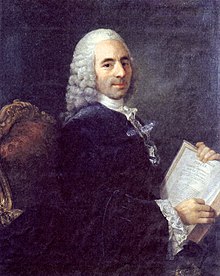François Quesnay
Appearance
(Redirected from Quesnay)

François Quesnay (June 4, 1694 – December 16, 1774) was a French economist of the Physiocratic school. He is known for publishing the "Tableau économique" (Economic Table) in 1758, which provided the foundations of the ideas of the Physiocrats.
| This economist article is a stub. You can help out with Wikiquote by expanding it! |
Quotes
[edit]- Sans la certitude de la propriété, le territoire resterait inculte.
- Without that sense of security which property gives, the land would still be uncultivated.
- Quesnay, (1888, p. 331), cited in: Velo Dario (2014). The EuroAtlantic Union Review: Vol. 1 - No. 0/2014. p. 96.
- You recognize but one rule of commerce; that is (to avail myself of your own terms) to allow free passage and freedom of action to all buyers and sellers whoever they may be.
- François Quesnay in letter from M. Alpha to de Quesnay, 1767; cited in: Antony Jay (2010). Lend Me Your Ears: Oxford Dictionary of Political Quotations. p. 253.
- Calculations are to the economic science what bones are to the human body. Without them it will always be a vague and confused science, at the mercy of error and prejudice.
- François Quesnay in letter to Mirabeau (Archives Nationales, Ms. 779, 4 bis, p.2 note); as cited in: Richard Van Den Berg and Albert Steenge. "Tableaux and Systèmes. Early French Contributions to Linear Production Models." Cahiers d'économie Politique/Papers in Political Economy 2 (2016): 11-30.
- To secure the greatest amount of pleasure with the least possible outlay should be the aim of all economic effort... when everyone does this the natural order, instead of being endangered, will be all the better assured.
- Questney, cited in: J. D. Vassie, Paul Chadburn (1935). Economics, Modern Business, p. 137.
Quotes about François Quesnay
[edit]- Mr. Smith was well known to M. Quesnai, the profound and original author of the Economical Table; a man (according to Mr. Smith's account of him) "of the greatest modesty and simplicity;" and whose system of political economy he has pronounced, "with all its imperfections," to be "the nearest approximation to the truth that has yet been published on the principles of that very important science." If he had not been prevented by Quesnai's death, Mr. Smith had once an intention (as he told me himself) to have inscribed to him his Wealth of Nations.
- François Quesnay was the leading figure of the Physiocrats, generally considered to be the first school of economic thinking. The name “Physiocrat” derives from the Greek words phýsis, meaning “nature,” and kràtos, meaning “power.” The Physiocrats believed that an economy’s power derived from its agricultural sector. They wanted the government of Louis XV, who ruled France from 1715 to 1774, to deregulate and reduce taxes on French agriculture so that poor France could emulate wealthier Britain, which had a relatively laissez-faire policy. Indeed, it was Quesnay who coined the term “laissez-faire, laissez-passer.”
- "François Quesnay." The Concise Encyclopedia of Economics. 2008. Library of Economics and Liberty. 21 July 2014.

